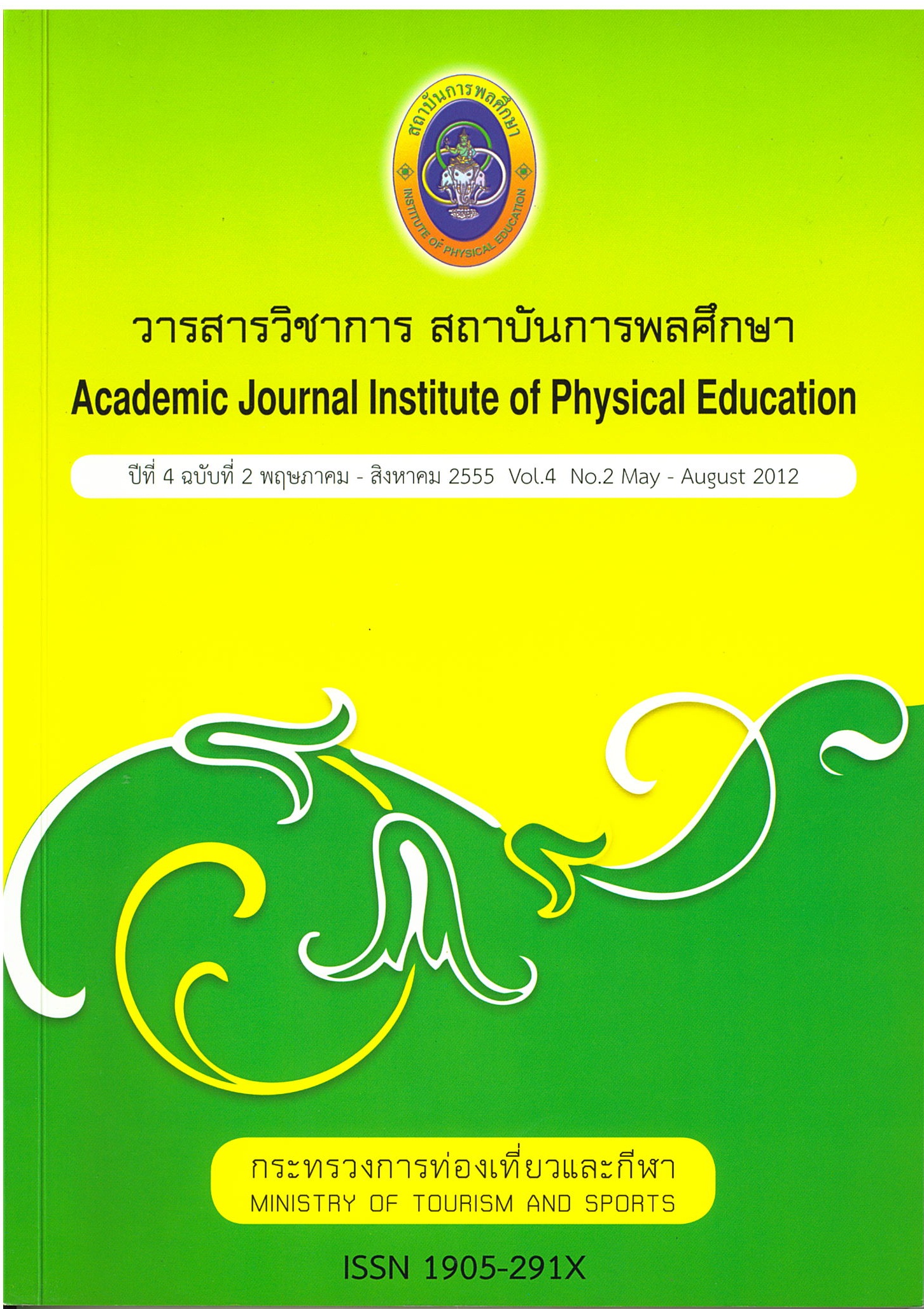FACTORS AFFECTING INFLUENTIAL LEARNING ON LEARNING ORGANIZATION OF PERSONNEL IN INSTITUTE OF PHYSICAL EDUCATION
Main Article Content
Abstract
This research aims to study the level of learning that affect to the organization's learning resources at the Institute for Physical Education. The procedures for qualitative research approach by in-depth interview gather information delve into 5 groups, including the president and 5 vice president of the institutes, 4 vice deans 4 staffs, 4 civil officers and 4 staffs on the totaling 22 persons and 4 group discussions are used to collect information from 16 executives, teacher, civil officers and staffs.
The results show that the level of learning organization, learning of the personnel at the Institute for Physical Education is on many levels. The focus on building knowledge by self-learning process, the thinking process and participatory learning The four elements that impact to the learning organization on the Institute of Physical Education is level of organizational culture on many levels of knowledge exchange, knowledge independent, shared vision and scholarship. For the level of support of leader is the support of leader at many levels. The focus on development support, appraisal support and instrumental support.
In the level of connection the focus on many levels. Focus on hubs, pulse taker and gate keeper. In the last in the application of technology in the same opinion that there must be significant to the level of the application of information technology on a large scale. The focus on data management. program management and knowledge management,
Article Details
The published article is a copyright of the Academic Journal of Thailand National Sports University. The passage appeared in each article in this academic journal is a perspective of each author which is not related to the journal. Each author is required to be responsible for all components of his/her own article. If there are any mistakes, each author must be responsible for those mistakes on his/her own.
References
ชัชวลิต สรวารี. (2550). “โครงสร้างองค์กร” คือตัวกําหนดพฤติกรรมของ “คนองค์กร” วันที่ 6 พฤศจิกายน 2550, สืบค้นเมื่อวันที่ 2 มกราคม 2552, จาก http://www.jobroads.net/article/ViewArticle.asp?ID_248
ประภัสสร บุญมี. (2547). การพัฒนาองค์การ มหาสารคาม: คณะวิทยาการจัดการ มหาวิทยาลัยราชภัฏมหาสารคาม.
วราภรณ์ ตระกูลสฤษดิ์. (2549). การทํางานเป็นทีม. กรุงเทพมหานคร: ศูนย์ส่งเสริมวิชาการ.
สมพงษ์ ชาตะวิถี. (2551). นโยบายการกํากับดูแลองค์การที่ดี. สถาบันการพลศึกษา กระทรวงการท่องเที่ยวและกีฬา.
สถาบันการพลศึกษา. (2551). รายงานการประเมินคุณภาพการศึกษาภายใน ประจําปี 2550. กระทรวงการท่องเที่ยวและกีฬา.
สํานักงานคณะกรรมการพัฒนาระบบราชการ. (2551). กระบวนทัศน์ วัฒนธรรม และค่านิยม กรณีของประเทศไทย. สืบค้นเมื่อวันที่ 9 ตุลาคม 2551, จาก http://www.goodpracticemodel.com/doc_004.php
อดิศร ไชยคุปต์. (2551). การบริหารการพัฒนาองค์การยุคโลกาภิวัตน์, วันที่ 22 มิถุนายน 2551, สืบค้นเมื่อวันที่ 9 ตุลาคม 2551, จาก http://www.up-ju.ago.go.th/selecttopic/TOPIC08.html
Belasen, A. (2000). Leading the learning organization. Albany, NY:SUNY Press.
Garvin, R.A. (2000). Building a learning organization and connection. Harvard Business Review, 71(4), 78-92.
Isaacs, W. (2002). Thking flight: Dialogue, collective thinking, and organizational learning. Organizational Dynamics, 24-39.
Jaskyte, K. (2004). Transformational leadership, organizational culture and innovativeness in nonprofit organizations. Nonprofit Management and Leadership, p. 153-168.
Manville, B. (2001). Learning in the new economy. Leader to leader, 20, 36-45.
Marquardt, M. J. (2002). Building the learning organization. Retrieved March 19, 2009, from http://www.emeraldinsigth.com/learning_org.html
Molnar, W. (2009). Learning organizations: personal mastery. Retrieved March 7, 2009, from http://www.scribd.com/doc/General-Systems-Education
Naddaff, M. (2008). Organizational behavior. Retrieved January 24, 2009, from http://www.extension.haveard.edu/2007-08/obhrel.pdf
Park, J. H., & Rojewski, J.W. (2006). The learning organization model across vocational and academic teacher groups. Retrieved August 25, 2008, from http://www.scholar.lib.vt.edu/ejouranal/CTER/v31n1/pdf/park.pdf
Pedler, M., Burgoynes, J., & Boydell, T. (1991, 1996). The Learning company: A strategy for sustainable development. Mardenhead: McGraw-Hill.
Richard, L. H. (2006). Theory organization. Retrieved January 2, 2009, from http://www.lls.edu/academics/faculty/hasen.html
Senge, P. M. (2004). Creating communities. Executive Excellence, 21(9), 4-5.
Steiger, N. M. & Steiger, D. M. (2007). Building mental models. Retrieved April 30, 2009, from http://www.elatewiki.org/index.php/Building_Mental_Models
Weick, K. (2005). The nontraditional quality of organizational learning. Organizational cience.


